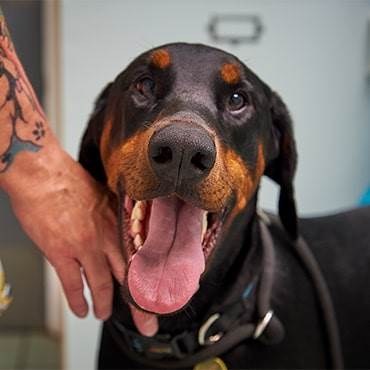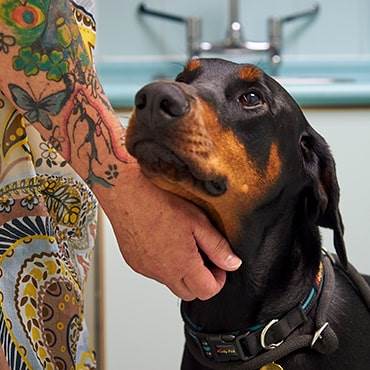Dobermann saved by PDSA after suffering near fatal twisted stomach
06 September 2019
Winston's recovery hailed a 'miracle'
A Dobermann puppy nearly died after developing a twisted stomach, also known as GDV (Gastric Dilation-Volvulus). Thankfully, action from his owner and vet charity PDSA saved Winston’s life, and he’s now been entered into PDSA’s Pet Survivor competition
When two-year-old Dobermann Winston stopped eating and couldn’t keep anything down, his owner Stella Draycot (56) was worried and took him to Basildon PDSA Pet Hospital, The Coco Markus Centre.
Thankfully Stella’s action saved his life after the charity’s vets identified that Winston had developed a twisted stomach, which can be fatal within just a few hours.
“He just wasn’t himself and I didn’t know what to do, so I took him to the PDSA Pet Hospital,” said Stella. “After the vet examined him, they discovered he had a twisted stomach and I was told that his chances of surviving were very slim. I was in shock and the thought of losing him left me in floods of tears.”
PDSA Vet, Hannah Johnston, explained: “When Winston arrived at the Pet Hospital he had a tender, swollen tummy and was trying to be sick but nothing was coming up. We were really concerned about these symptoms and took him straight for an x-ray, which showed a massive, gas-filled, ‘C’ shaped stomach. This is a tell-tale sign of GDV, which is a twisted stomach. We knew immediately that we had to act fast, as this can kill a dog within hours if left untreated.”
The official term for this condition is Gastric Dilation-Volvulus (GDV), and happens when two things occur: one, an abnormal amount of gas builds up in the stomach, and two, the stomach twists round on itself. Once the stomach twists, the gas can’t escape and pressure builds up. This pressure can restrict blood flow, affect breathing, lead to shock, and if not treated quickly, the stomach wall can become damaged, causing it to bruise, start to die away, or rupture. The condition is more common in large or deep-chested breeds, including Dobermanns like Winston, but also breeds like Great Danes, Basset Hounds, Saint Bernards and Irish Setters.
Hannah continued: “Winston was immediately prepped for emergency surgery to untwist his stomach, but because of his deteriorating condition the anaesthetic he needed, this posed a much higher risk. We prepared his owner for the worst but we were determined to do everything we could to save him. The surgery went as well as it could have, and we also placed some internal stitches to secure the stomach to the body wall to try and prevent it from twisting around again.”
Thankfully, Winston, who has just celebrated his second birthday, has made a great recovery and is back to enjoying walks with his friends. “I’m so glad to have my best friend back home safe and sound,” said Stella. “I feel that Winston is a miracle dog for surviving. The treatment and care he received from PDSA was fantastic, I’m so very grateful that they saved his life.”
Stella has now entered Winston into the PDSA Pet Survivor awards to recognise his survival spirit, and the determination and skill of the vets and nurses who saved his life. The annual competition recognises pets who have survived against all the odds. The closing date for the 2019 awards in Sunday 8 September (midnight) and entries can be submitted at www.pdsa.org.uk/petsurvivor.
How to prevent GDV
PDSA Vet Hannah added: “It’s really important to keep an eye out for any changes in your pet’s behaviour, especially if they are a higher risk breed. Signs to look out for include drooling, retching or trying to vomit without producing anything, anxious behaviour and attempts to stretch or restlessness, and a swollen or hard stomach. Surgery is most successful when the condition is still in the early stages, so Stella’s quick action in bringing Winston straight to PDSA saved his life.”
Ways to reduce the risk of your dog developing bloat may include:
- Split your dog’s daily food allowance into several small meals during the day, rather than feeding one big meal.
- Slow down your dog’s eating rate – special food bowls are available to help with this. Puzzle feeders can also help slow down eating.
- If you own more than one dog, feed them separately to prevent them competing and eating too quickly.
- Avoid heavy activity immediately before or after your dog eats.
- Reduce stress for your dog – if they are prone to nervous or fearful behaviour, or get stressed in certain situations, then getting help from a qualified, registered behaviourist is recommended.
- Feeding your pet on a raised platform can actually increase their risk of GDV, so feed them at floor level as normal.


Enter Pet Survivor
Entries for Pet Survivor are closing soon! If you know a brave pet who has dodged death in a miraculous manner, then we want to hear about them.
Enter nowThe Pet Health Hub
The Hub is the place to find free, factual information about your pet’s health. Written by vets and vet nurses, packed full of useful articles, images and videos.
Visit the hub